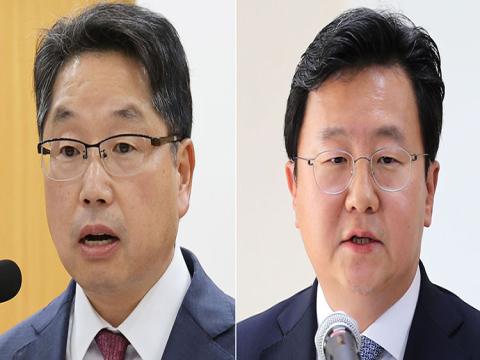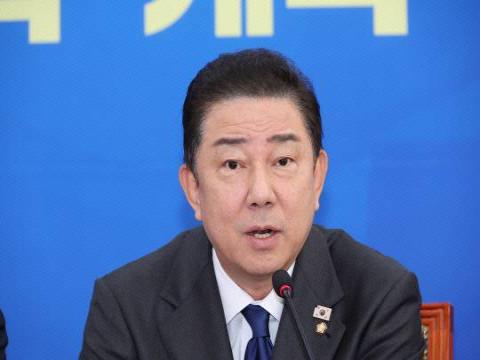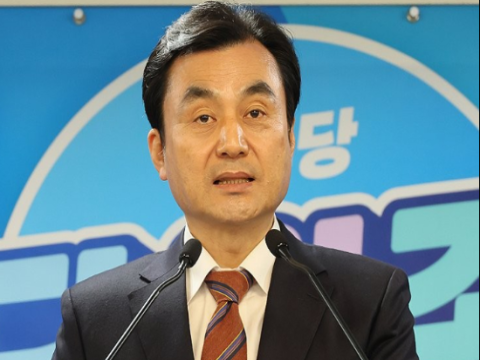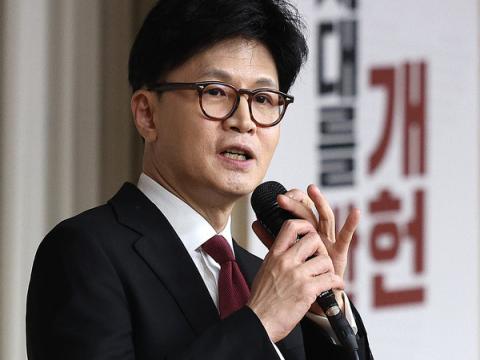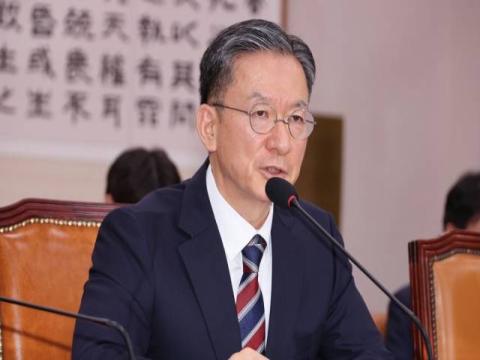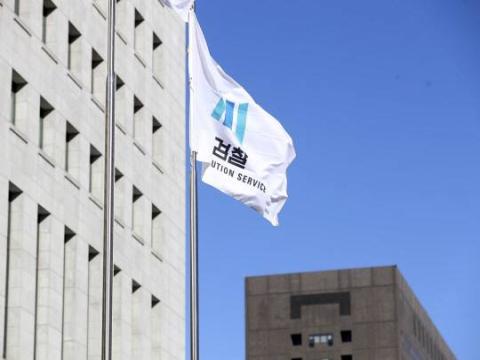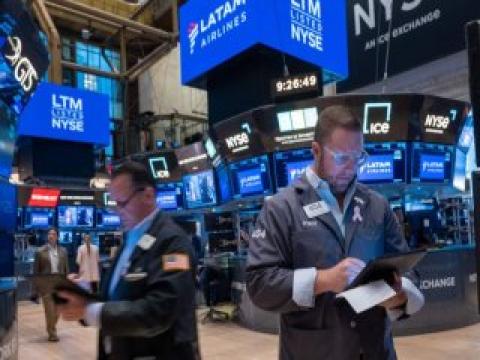아시아인권단체들, MB정권에 뿔 났다!
"유엔 및 '국경없는기자회'에 촛불 인권탄압 조사 촉구하겠다"
법무부와 경찰청이 국제 앰네스티의 수감자 및 복무전환 신청 전경 접견 요구를 거부한 데 이어, 이번에도 아시아인권위원회-포럼아시아 조사관들의 수감자 접견을 거부하는 동시에 조사관들의 면담 요청조차 거부한 것으로 드러났다.
아시아인권단체들은 이명박 정부의 이같은 조치에 격노하며 유엔 및 '국경없는 기자회' 등 국제 인권단체 및 언론단체의 촛불 인권탄압 조사를 촉구하겠다고 경고, 한국에 졸지에 국제사회에서 인권후진국으로 전락하는 양상이다.
공동조사단 "법무부-경찰청, 면담 요구 거절"
아시아인권위원회-포럼아시아 조사관들은 25일 오전 정동세실레스토랑에서 지난 21~24일 행한 공동조사 결과를 발표하며 “우리는 법무부와 경찰청에 면담을 요구했지만 법무부는 바쁜 일정을 이유로 거부했고 경찰청은 아무런 반응을 보이지 않았다”며 강한 유감을 표시했다.
조사관들은 또 “서울구치소에 수감된 안진걸, 황순원, 윤희숙, 문용식씨와의 면담을 요청했지만 서울구치소는 이를 거절했다”고 말했다. 에멀린 길 공동조사관은 서울구치소의 면담 거부 이유에 대해 “우리의 접견이 수용자 처우에 맞지 않고 진행 중인 재판에 영향을 줄 수 있다는 답변을 받았다”고 밝혔다.
이들은 결국 법무부에 집회 및 언론의 자유, 인권활동가들의 구속수감, 집회 진압 과정에서의 경찰의 행위 등에 대한 총 15개 질문을 담은 질의서를 보내고 답변을 기다리기로 했다.
"경찰의 의료지원단-인권변호사 폭행 확인"
조사관들은 이날 지난 국제앰네스티와 달리 한글 번역본의 오역에 의한 조사왜곡을 우려해 영문본만 발표하는 등 공정성 시비에 신경쓰면서도 촛불집회 현장에서의 경찰의 폭력적인 진압 사례에 대해 강도 높게 비판했다.
이들은 구체적인 인권탄압 사례로 진압 과정을 촬영하다 폭행당한 남성, 의료지원단 활동을 하다 폭행당한 여성, 경찰의 방패 가격으로 중상을 입은 이준형 변호사 등을 적시했다.
이들은 특히 “지난 6월 28일 저녁 10시, 프레스센터 앞에서 공격당한 의료지원단의 여성은 의료진임을 명확히 보여주는 조끼 및 헬멧을 착용하고 있었지만 방패에 가격당했다”며 “이 여성은 자신이 부상을 입었음에도 불구하고 몇몇 경찰을 포함한 부상자들에 대한 치료를 계속했다”고 지적했다.
이들은 또 “‘인권침해 감시 변호인단’ 조끼를 착용하고 있던 변호사도 6월 26일 새벽 1시 30분에 경찰에 맞아 의식을 잃었다”고 이준형 민변 변호사의 사례를 지적했다.
이들은 또 MBC <PD수첩>에 대한 검찰수사에 대해서도 "명백히 매체를 검열하는 시도를 했다"고 비판했으며, 한국정부의 인터넷 실명제 강화 방침에 대해서도 “의사표현의 자유를 심각하게 제한하는 조치”라고 비판했다.
공동조사관들은 나흘간 조사를 바탕으로 한국정부와 법무부에 ▲국제적인 인권 기준 준수 ▲인권옹호자에 대해 폭력을 행사한 관계자 처벌 ▲전의경제도 폐지 ▲집회의 자유를 제한하는 야간 집회 금지 법률 개정 등을 촉구했다. 이들은 경찰청에도 국제기준에 따른 인권 교육을 모든 경찰관에게 실시할 것을 촉구했다.
"유엔 등 국제인권단체의 한국 방문 조사 촉구할 것"
공동조사관들은 이번 조사 결과를 바탕으로 오는 9월까지 최종보고서를 작성하고, 유엔의 인권옹호자특별보고관의 한국 방문 조사도 촉구할 예정이다.
이들은 또 ‘국경없는 기자회’ 등 국제언론단체들에게도 인권침해 사항에 대한 방문 조사를 촉구하는 등 촛불집회에서 나타난 인권침해 사례를 국제 이슈화하겠다는 방침을 분명히 했다.
이들은 국제앰네스티와 법무부간의 공정성 시비 논란에 대해선 “아직 한국 정부의 답변을 기다리는 중이지만 우리는 인권단체로서 조사보고서에 대한 반박을 오히려 환영한다”며 “그래야 생산적인 정책 방향 설정이 가능하기 때문”이라며 언제든지 반론을 수용하겠고 밝혔다. 이들은 나아가 “한국정부와 공개토론회를 제안한다"며 "한국정부가 우리의 질의에 대해 어떤 입장을 갖고 있는지 들어보고 싶다”고 말하기도 했다.
아시아 15개국의 40개 인권단체가 참여하고 있는 ‘포럼아시아’와 아시아 인권상황을 연구·조사해온 ‘아시아인권위원회’는 지난 21일 방한해 24일까지 나흘간 시민단체 활동가, 인권변호사, 국가인권위원회 관계자들을 만나 촛불집회에서의 인권침해 사례를 조사해왔다.
다음은 이날 이들이 발표한 기자회견문 전문
Press Statement of the Joint Fact-Finding Mission of Asian Forum for Human Rights and Development (FORUM-ASIA) and the Asian Human Rights Commission (AHCR)
I. Background of the Mission
The Asian Forum for Human Rights and Development (FORUM-ASIA) and the Asian Human Rights Commission (AHRC) decided to conduct a fact-finding mission, consisting of four members, to South Korea from 21-24 July 2008 in the light of numerous reports of human rights violations since May. The two regional human rights organisations consider the events recently occurring in South Korea of regional importance because South Korea is viewed as a benchmark for democracy and human rights in Asia. We believe that the decline of democracy and increase of human rights violations in South Korea would have an impact on the rest of the region.
The main focus of our mission has been to examine the situation of human rights defenders and the state of freedom of opinion and expression in the light of the rallies against the agreement between the United States and South Korea to lift US beef import restrictions. It is especially significant for us to look into the situation of human rights defenders since this year is the celebration of the 10th Anniversary of the UN Declaration on Human Rights Defenders. The adoption of this declaration is important as it is viewed as a step towards the promotion and protection of the rights of human rights defenders because it outlines the responsibilities of states and non-state actors in protecting these persons’ rights.
During our mission this week, we met with eight non-governmental organisations (NGOs), 12 human rights defenders (e.g. lawyers, NGO workers, journalists, and medical workers), the Ministry of Foreign Affairs and Trade (MOFAT), and the National Human Rights Commission of Korea (NHRCK). We also attended the trial of a human rights defender, Ms. Yoon Hee-Sook. We requested appointments with the Ministry of Justice and the National Police Agency. Because of the Ministry of Justice’s busy schedule, we were not able to meet them this week. There was no response to our request from the National Police Agency. We also sent a request to the Seoul Detention Center to meet with four detainees, Mr. Ahn Jin-Geol, Mr. Hwang Soon-Won, Ms. Yoon Hee-Sook, and Mr. Moon Yong-Sik. The Seoul Detention Center refused our request.
II. Initial Findings
It is important for us to note that this press conference may be the conclusion of our visit, but not the conclusion of our mission. Even after our departure, we will continue communicating with government and human rights defenders in South Korea. In fact, we have transmitted a list of questions and concerns to the Ministry of Justice and we await their response.
Our initial findings show that there have been incidents of attacks against human rights defenders during the series of rallies over the past two months. Also, we have found that there is a trend towards unduly limiting freedom of opinion and expression in the media and the internet.
The information we have gathered indicate that most of the attacks against human rights defenders were committed by riot police. We note that the riot police deployed to these rallies consist of young men, between the ages of 19 and 23, who have been conscript-xed. For instance, we have gathered information that about a journalist who was attacked by riot police on 29 June, at 7 o’clock in the evening, in front of the Samsung Tower. This journalist was taking pictures with his camcorder of the protest when a group of riot police rushed towards him, surrounded him, and started beating him up. His camcorder was damaged because of the attack. Another case we have documented is about a volunteer medical worker who was attacked in front of the Press Center on 28 June, at 10 o’clock in the evening. She was wearing a helmet and a vest which clearly identified her as part of the volunteer medical team. Despite her being clearly identified as a volunteer medical worker, riot police rushed towards her and hit her with a shield. She fell down and got back up, but despite her injuries she continued to assist the injured people, which included several riot policemen. We have also gathered information about a lawyer who was wearing a vest which was clearly marked “A Group of Lawyers Monitoring Human Rights Violations.” He was beaten unconscious by riot police on 26 June, at around 1:30 in the morning.
Some of the information we have gathered on the trend towards increasing restrictions on freedom of opinion and expression include proposed expansion of criminal defamation into cyberspace. We view this as going against the global trend of decriminalizing defamation. Criminal defamation statutes have been viewed as undue infringement of freedom of opinion and expression since it has often been used by governments to suppress political dissent and democratic discourse. We also emphasize that under international law, governments and public officials should expect less protection under defamation statutes because of their status as servants of the people.
We have also gathered information of apparent attempts to censor media, such as the case of MBC’s PD Notebook program.
III. Recommendations
Based on our initial findings, we therefore recommend the following:
(a) To the government:
· Set an example in the region in the compliance of international human rights standards, considering the fact that it is a member of the UN Human Rights Council;
· Take steps to implement the UN Declaration on Human Rights Defenders;
· Conduct investigations into allegations on attacks against human rights defenders and bring perpetrators to justice;
· Abolish the current system of conscript-xion of young men into the riot police;
(b) To the Ministry of Justice:
· Amend laws unduly restricting freedom of opinion, expression and assembly, in particular those provisions under the Act on Assembly and Demonstration which prohibit public assemblies after dark;
· Comply with international human rights standards and decriminalize defamation in order to promote democratic discourse;
(c) To the National Police Agency:
· Provide comprehensive and mandatory training to police officers that are deployed to rallies and assemblies, so that these police officers would understand that as guarantors of people’s dignity and rights, they also need to respect the right to free flow of information and ensure the right to freedom of assembly;
· Make human rights training mandatory to all police officers in accordance with international standards;
(d) To the National Human Rights Commission of Korea:
· Strive to keep the independence that has made it highly regarded in the region, as its independence is essential to its effectiveness to protect human rights defenders on the ground.
IV. Future Steps
As we have mentioned earlier, we will continue to communicate with government and human rights defenders in Korea. Moreover, FORUM-ASIA and AHRC aim to use our findings to launch a campaign at the UN Human Rights Council regarding the human rights situation in South Korea. We hope to encourage the relevant special procedures (e.g. Special Rapporteurs on Human Rights Defenders, Freedom of Opinion and Expression, and the Right to Health) to accept the standing invitation of the government and conduct country visits to investigate the human rights situation in South Korea.
아시아인권단체들은 이명박 정부의 이같은 조치에 격노하며 유엔 및 '국경없는 기자회' 등 국제 인권단체 및 언론단체의 촛불 인권탄압 조사를 촉구하겠다고 경고, 한국에 졸지에 국제사회에서 인권후진국으로 전락하는 양상이다.
공동조사단 "법무부-경찰청, 면담 요구 거절"
아시아인권위원회-포럼아시아 조사관들은 25일 오전 정동세실레스토랑에서 지난 21~24일 행한 공동조사 결과를 발표하며 “우리는 법무부와 경찰청에 면담을 요구했지만 법무부는 바쁜 일정을 이유로 거부했고 경찰청은 아무런 반응을 보이지 않았다”며 강한 유감을 표시했다.
조사관들은 또 “서울구치소에 수감된 안진걸, 황순원, 윤희숙, 문용식씨와의 면담을 요청했지만 서울구치소는 이를 거절했다”고 말했다. 에멀린 길 공동조사관은 서울구치소의 면담 거부 이유에 대해 “우리의 접견이 수용자 처우에 맞지 않고 진행 중인 재판에 영향을 줄 수 있다는 답변을 받았다”고 밝혔다.
이들은 결국 법무부에 집회 및 언론의 자유, 인권활동가들의 구속수감, 집회 진압 과정에서의 경찰의 행위 등에 대한 총 15개 질문을 담은 질의서를 보내고 답변을 기다리기로 했다.
"경찰의 의료지원단-인권변호사 폭행 확인"
조사관들은 이날 지난 국제앰네스티와 달리 한글 번역본의 오역에 의한 조사왜곡을 우려해 영문본만 발표하는 등 공정성 시비에 신경쓰면서도 촛불집회 현장에서의 경찰의 폭력적인 진압 사례에 대해 강도 높게 비판했다.
이들은 구체적인 인권탄압 사례로 진압 과정을 촬영하다 폭행당한 남성, 의료지원단 활동을 하다 폭행당한 여성, 경찰의 방패 가격으로 중상을 입은 이준형 변호사 등을 적시했다.
이들은 특히 “지난 6월 28일 저녁 10시, 프레스센터 앞에서 공격당한 의료지원단의 여성은 의료진임을 명확히 보여주는 조끼 및 헬멧을 착용하고 있었지만 방패에 가격당했다”며 “이 여성은 자신이 부상을 입었음에도 불구하고 몇몇 경찰을 포함한 부상자들에 대한 치료를 계속했다”고 지적했다.
이들은 또 “‘인권침해 감시 변호인단’ 조끼를 착용하고 있던 변호사도 6월 26일 새벽 1시 30분에 경찰에 맞아 의식을 잃었다”고 이준형 민변 변호사의 사례를 지적했다.
이들은 또 MBC <PD수첩>에 대한 검찰수사에 대해서도 "명백히 매체를 검열하는 시도를 했다"고 비판했으며, 한국정부의 인터넷 실명제 강화 방침에 대해서도 “의사표현의 자유를 심각하게 제한하는 조치”라고 비판했다.
공동조사관들은 나흘간 조사를 바탕으로 한국정부와 법무부에 ▲국제적인 인권 기준 준수 ▲인권옹호자에 대해 폭력을 행사한 관계자 처벌 ▲전의경제도 폐지 ▲집회의 자유를 제한하는 야간 집회 금지 법률 개정 등을 촉구했다. 이들은 경찰청에도 국제기준에 따른 인권 교육을 모든 경찰관에게 실시할 것을 촉구했다.
"유엔 등 국제인권단체의 한국 방문 조사 촉구할 것"
공동조사관들은 이번 조사 결과를 바탕으로 오는 9월까지 최종보고서를 작성하고, 유엔의 인권옹호자특별보고관의 한국 방문 조사도 촉구할 예정이다.
이들은 또 ‘국경없는 기자회’ 등 국제언론단체들에게도 인권침해 사항에 대한 방문 조사를 촉구하는 등 촛불집회에서 나타난 인권침해 사례를 국제 이슈화하겠다는 방침을 분명히 했다.
이들은 국제앰네스티와 법무부간의 공정성 시비 논란에 대해선 “아직 한국 정부의 답변을 기다리는 중이지만 우리는 인권단체로서 조사보고서에 대한 반박을 오히려 환영한다”며 “그래야 생산적인 정책 방향 설정이 가능하기 때문”이라며 언제든지 반론을 수용하겠고 밝혔다. 이들은 나아가 “한국정부와 공개토론회를 제안한다"며 "한국정부가 우리의 질의에 대해 어떤 입장을 갖고 있는지 들어보고 싶다”고 말하기도 했다.
아시아 15개국의 40개 인권단체가 참여하고 있는 ‘포럼아시아’와 아시아 인권상황을 연구·조사해온 ‘아시아인권위원회’는 지난 21일 방한해 24일까지 나흘간 시민단체 활동가, 인권변호사, 국가인권위원회 관계자들을 만나 촛불집회에서의 인권침해 사례를 조사해왔다.
다음은 이날 이들이 발표한 기자회견문 전문
Press Statement of the Joint Fact-Finding Mission of Asian Forum for Human Rights and Development (FORUM-ASIA) and the Asian Human Rights Commission (AHCR)
I. Background of the Mission
The Asian Forum for Human Rights and Development (FORUM-ASIA) and the Asian Human Rights Commission (AHRC) decided to conduct a fact-finding mission, consisting of four members, to South Korea from 21-24 July 2008 in the light of numerous reports of human rights violations since May. The two regional human rights organisations consider the events recently occurring in South Korea of regional importance because South Korea is viewed as a benchmark for democracy and human rights in Asia. We believe that the decline of democracy and increase of human rights violations in South Korea would have an impact on the rest of the region.
The main focus of our mission has been to examine the situation of human rights defenders and the state of freedom of opinion and expression in the light of the rallies against the agreement between the United States and South Korea to lift US beef import restrictions. It is especially significant for us to look into the situation of human rights defenders since this year is the celebration of the 10th Anniversary of the UN Declaration on Human Rights Defenders. The adoption of this declaration is important as it is viewed as a step towards the promotion and protection of the rights of human rights defenders because it outlines the responsibilities of states and non-state actors in protecting these persons’ rights.
During our mission this week, we met with eight non-governmental organisations (NGOs), 12 human rights defenders (e.g. lawyers, NGO workers, journalists, and medical workers), the Ministry of Foreign Affairs and Trade (MOFAT), and the National Human Rights Commission of Korea (NHRCK). We also attended the trial of a human rights defender, Ms. Yoon Hee-Sook. We requested appointments with the Ministry of Justice and the National Police Agency. Because of the Ministry of Justice’s busy schedule, we were not able to meet them this week. There was no response to our request from the National Police Agency. We also sent a request to the Seoul Detention Center to meet with four detainees, Mr. Ahn Jin-Geol, Mr. Hwang Soon-Won, Ms. Yoon Hee-Sook, and Mr. Moon Yong-Sik. The Seoul Detention Center refused our request.
II. Initial Findings
It is important for us to note that this press conference may be the conclusion of our visit, but not the conclusion of our mission. Even after our departure, we will continue communicating with government and human rights defenders in South Korea. In fact, we have transmitted a list of questions and concerns to the Ministry of Justice and we await their response.
Our initial findings show that there have been incidents of attacks against human rights defenders during the series of rallies over the past two months. Also, we have found that there is a trend towards unduly limiting freedom of opinion and expression in the media and the internet.
The information we have gathered indicate that most of the attacks against human rights defenders were committed by riot police. We note that the riot police deployed to these rallies consist of young men, between the ages of 19 and 23, who have been conscript-xed. For instance, we have gathered information that about a journalist who was attacked by riot police on 29 June, at 7 o’clock in the evening, in front of the Samsung Tower. This journalist was taking pictures with his camcorder of the protest when a group of riot police rushed towards him, surrounded him, and started beating him up. His camcorder was damaged because of the attack. Another case we have documented is about a volunteer medical worker who was attacked in front of the Press Center on 28 June, at 10 o’clock in the evening. She was wearing a helmet and a vest which clearly identified her as part of the volunteer medical team. Despite her being clearly identified as a volunteer medical worker, riot police rushed towards her and hit her with a shield. She fell down and got back up, but despite her injuries she continued to assist the injured people, which included several riot policemen. We have also gathered information about a lawyer who was wearing a vest which was clearly marked “A Group of Lawyers Monitoring Human Rights Violations.” He was beaten unconscious by riot police on 26 June, at around 1:30 in the morning.
Some of the information we have gathered on the trend towards increasing restrictions on freedom of opinion and expression include proposed expansion of criminal defamation into cyberspace. We view this as going against the global trend of decriminalizing defamation. Criminal defamation statutes have been viewed as undue infringement of freedom of opinion and expression since it has often been used by governments to suppress political dissent and democratic discourse. We also emphasize that under international law, governments and public officials should expect less protection under defamation statutes because of their status as servants of the people.
We have also gathered information of apparent attempts to censor media, such as the case of MBC’s PD Notebook program.
III. Recommendations
Based on our initial findings, we therefore recommend the following:
(a) To the government:
· Set an example in the region in the compliance of international human rights standards, considering the fact that it is a member of the UN Human Rights Council;
· Take steps to implement the UN Declaration on Human Rights Defenders;
· Conduct investigations into allegations on attacks against human rights defenders and bring perpetrators to justice;
· Abolish the current system of conscript-xion of young men into the riot police;
(b) To the Ministry of Justice:
· Amend laws unduly restricting freedom of opinion, expression and assembly, in particular those provisions under the Act on Assembly and Demonstration which prohibit public assemblies after dark;
· Comply with international human rights standards and decriminalize defamation in order to promote democratic discourse;
(c) To the National Police Agency:
· Provide comprehensive and mandatory training to police officers that are deployed to rallies and assemblies, so that these police officers would understand that as guarantors of people’s dignity and rights, they also need to respect the right to free flow of information and ensure the right to freedom of assembly;
· Make human rights training mandatory to all police officers in accordance with international standards;
(d) To the National Human Rights Commission of Korea:
· Strive to keep the independence that has made it highly regarded in the region, as its independence is essential to its effectiveness to protect human rights defenders on the ground.
IV. Future Steps
As we have mentioned earlier, we will continue to communicate with government and human rights defenders in Korea. Moreover, FORUM-ASIA and AHRC aim to use our findings to launch a campaign at the UN Human Rights Council regarding the human rights situation in South Korea. We hope to encourage the relevant special procedures (e.g. Special Rapporteurs on Human Rights Defenders, Freedom of Opinion and Expression, and the Right to Health) to accept the standing invitation of the government and conduct country visits to investigate the human rights situation in South Korea.
<저작권자ⓒ뷰스앤뉴스. 무단전재-재배포금지>

